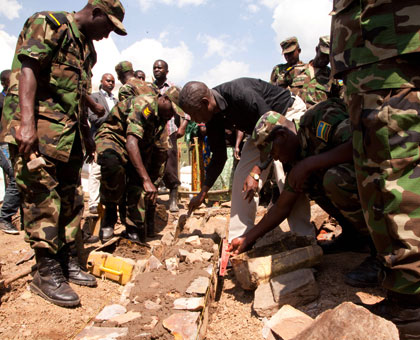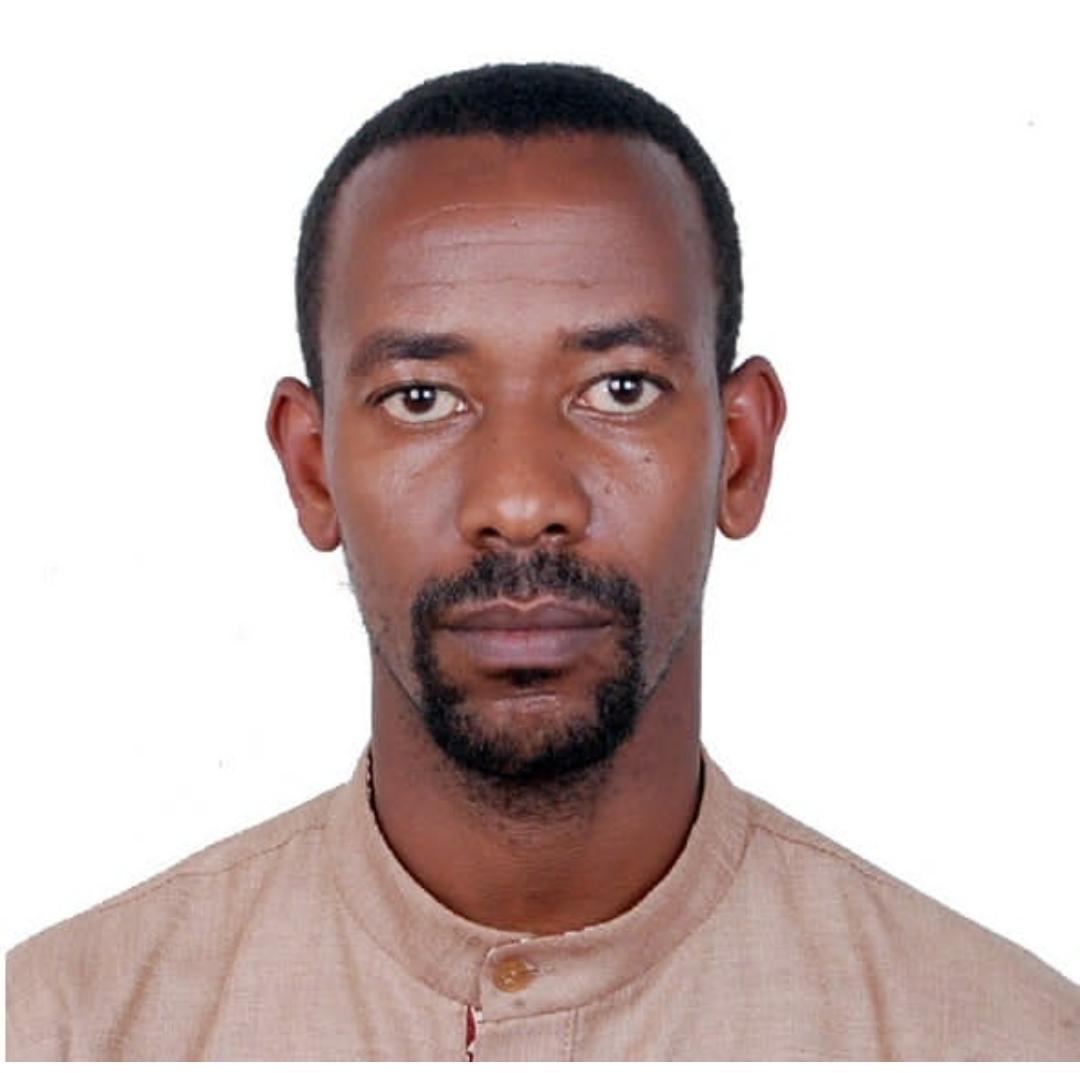Tens of hundreds of people in various parts of the country yesterday took part in events that precede celebrations to mark the 20th anniversary of the liberation struggle dubbed ‘Kwibohora20.’


Tens of hundreds of people in various parts of the country yesterday took part in events that precede celebrations to mark the 20th anniversary of the liberation struggle dubbed ‘Kwibohora20.’
They included the laying of foundation stones in five locations where the Rwanda Defence Forces (RDF) intends to construct health posts.
The RDF announced plans to construct 500 health posts across the country by the end of the year, but the first phase of the activities will see 44 health centres constructed during the annual Army Week.
Speaking from Gatoma Sector, in Gicumbi District, the Minister for Defence, James Kabarebe, told residents that the liberation struggle had not ended as there was still an ongoing battle against poverty.
Kabarebe dwelt more on the reasons that pushed the then Rwanda Patriotic Army (RPA) to take up arms, and rallied the population to join hands in implementing developmental projects and improving their welfare.
"2014 is an important year to all Rwandans; it is a year that we commemorate the Genocide for the 20th time, but it also marks the liberation of our people from the shackles of fascist regime,” said Kabarebe.
He added that the liberation struggle’s main objectives were to unite people, ensure their welfare and emphasise good and accountable governance.
"When the RPA launched its attack in 1990, it had very few fighters and was weak compared to the enemy. But what motivated the fighters to soldier on was the cause they fought for,” the minister said.
"In 1993, the Commander-in-Chief, President Paul Kagame, assembled soldiers in Mukarange and reminded them that they were to be the foundation of Rwanda.”
He added that the RDF take part in social affairs because they are motivated by the 1993 liberation address during which then RPA commander also requested them to be exceptional.
"The war and the Genocide ended but the liberation struggle continues. We are now fighting alongside our people against poverty and to achieve development,” he said.
The Governor of Northern Province, Aime Bosenibamwe, said Gicumbi was an important place in the liberation struggle, the reason behind RDF’s decision to "return to its roots” to celebrate the 20th anniversary.
The area served as the RPA High Command during the liberation struggle, and according to Defence and Military spokesperson Joseph Nzabamwita, it was here that President Kagame issued the order to halt the Genocide against the Tutsi.
Speaking to the media, , Brig. Gen. Nzabamwita said the construction of each of the four-room health posts costs between Rwf22 million to Rwf25 million, but the actual cost reduces to Rwf13 million because of the involvement of the RDF and the residents.
RDF’s total contribution to the construction of the 44 health posts in the first phase was estimated at around Rwf400 million.
Kicukiro
In Kagarama Sector, Kicukiro District, the Chief of Defence Staff, Gen. Patrick Nyamvumba, echoed a similar message, saying although the country was liberated, the struggle continues with the aim of elevating people’s social-economic welfare.
"The move to liberate our country continues that’s why we still work together residents to achieve our goals. We have achieved a lot and we will continue strengthening our cooperation with you for the betterment of all,” Gen. Nyamvumba said.
Local Government minister James Musoni, on his part, noted that the country was divided by colonialists and bad leaders that led to the promotion of divisionism, sectarianism and disunity among Rwandans, which ultimately led to the 1994 Genocide against the Tutsi.
He said 20 years down the road, government is reaching its goal of bringing them together to achieve a common destiny.
The minister said due to good governance, 98 per cent Rwandans prefer being referred as Rwandans, not Tutsi, Hutu or Twa.
"Today, Rwandans have dignity and we are working towards self-reliance. We have not gotten external support to put up this health post; it’s our manpower and the will to work together,” Musoni said.
In Eastern Province, the construction was launched in Rugarama Cell in Nyagatare District.
Residents danced to the tune of popular liberation songs before joining the RDF, Police, and Ministry of Health officials in laying a foundation stone for their health post.
To many in the area, the planned medical facility will be a symbol of "the fruits of the liberation struggle” that was virtually launched in the district, 20 years ago.
"We are happy for many things achieved in the past 20 years, but more so, we are very happy that it is here, in the Eastern Province, and especially Nyagatare, that was the gateway for the liberation of this country,” said the Governor of Eastern Province, Odette Uwamariya.
"It is through this region that the gallant soldiers that went on to liberate this country entered,” Uwamariya said in reference to the October 1, 1990, attack through Kagitumba, near the Uganda border.
Army Chief of Staff Frank Mushyo Kamanzi assured the buoyant residents of the RDF’s never ending support. He also stressed that security entails a lot, including ensuring that citizens have all basic necessities such as good health, food and shelter.
For the past 20 years, he said, much had been achieved because of a civil military cooperation that was only getting better.
"With this kind of cooperation and understanding, we can’t fail in anything we want to do for our nation,” Maj. Gen. Kamanzi said.
What the people say about ‘Kwibohora20’ activities
Phoebe Nyiranjara, an elderly resident of Bubare Village in Nyagatare and a survivor of the Genocide.
‘I have lived here since 2001. The liberation struggle saved me. I am no longer living in isolation as I used to. I am settled and happy and the fact that people come here, we sing and dance and be happy together. I can only thank God and the RPA that liberated us. Now, they have embarked on building a health post for us and this so good. I am a person with a physical disability given my constant back-ache, as well as knee and muscular pains, and as such it is always difficult to travel long distances for medical assistance.’
____________________
Fred Rudasingwa, rice farmer in Bubare Village who returned home from exile in Uganda 20 years ago.
‘Liberation was and is just so good seeing that people were forced to live in exile not until the RPA started the effort to liberate our country. Today, everything is wonderful as we are independent unlike before when we suffered humiliation. Today, our children are in school and I can afford medical care for them. This means everything to me.’
_________________________
Jean Pierre Sindikubwayo, a 28-year-old casual labourer from Mushenyi Village in Nyagatare.
‘I am so happy about the upcoming Liberation Day, especially seeing our soldiers come to start such an important project for us. There is no reason why I cannot thank the government for the cooperation it continues to promote with the population. This never happened in the early 90s or before. Good things are happening; I see all Rwandans embracing the liberation spirit. People are achieving things they never thought they could because they are liberated.’
____________________
Marakiya Kanani, Kagarama resident, Kicukiro. ‘It was tiring walking for almost three hours to Niboyi or Gahanga health centres. I’m happy that I will be able to easily access medication.
____________________
Violet Mushinjimana, Kicukiro.
‘Before the liberation, solders were seen as enemies; we could not socialise with them, we used to hide from them. Today, we work together in activities that help develop our country.’


